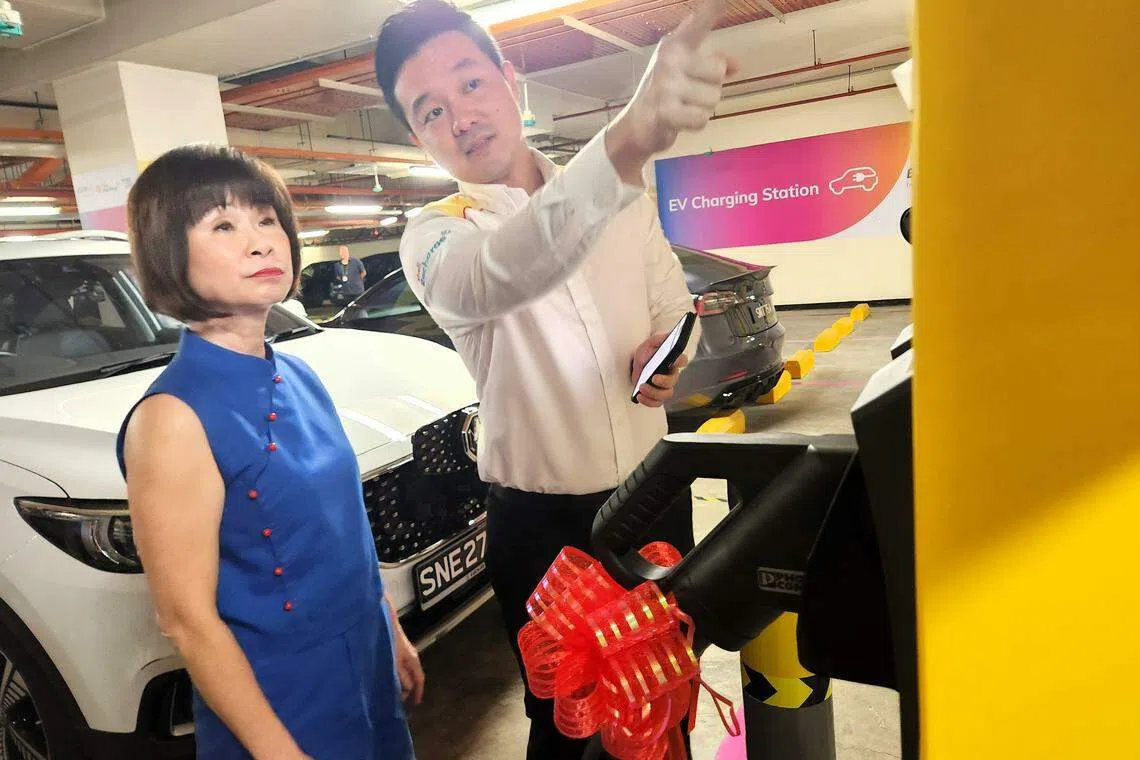New public fast chargers to be rolled out as EVs account for one-fifth of new car registrations

Derryn Wong
NEW public fast chargers aimed at serving fleet and high-mileage electric vehicle (EV) drivers will be rolled out as the EV industry hit new milestones.
The new fast chargers, which begin public operation on Jan 19, are located at the Housing Development Board (HDB) Hub in Toa Payoh, and the Oasis Terraces integrated development in Punggol.
Senior Minister of State for the Ministry of Sustainability and the Environment Amy Khor said that while slow charging will be able to serve the needs of most drivers, fast chargers are needed “as a supplement”, especially for high-mileage vehicles such as taxis, private-hire cars and commercial fleets.
Speaking at the launch of the new chargers at the HDB Hub on Thursday (Jan 18), Dr Khor noted that most existing fast chargers are located in commercial malls and offices. These have higher parking fees and are “not preferred rest spots for taxi and fleet drivers”.
“Now beyond these two locations, we will be deploying fast chargers in other HDB neighbourhoods, as well as town centres and JTC industrial estates frequented by these few drivers,” she added, without elaborating on the number of new fast chargers or the timeframe for their roll-out.
The fast chargers at HDB Hub are operated by Shell and allow for the recharging of up to six vehicles.
Navigate Asia in
a new global order
Get the insights delivered to your inbox.
Four vehicles can be accommodated at two stations – capable of up to 120 kilowatt (kW) direct-current charging. Another two vehicles can be parked at two 22 kW alternating-current (AC) chargers.
The fast chargers at Oasis Terraces are operated by SP Mobility and can also accommodate up to six vehicles. This includes one 100 kW DC charger for up to two vehicles and four 22 kW AC chargers.
The new fast chargers are an addition to the Land Transport Authority tender awarded in November 2022 for the installation of EV chargers at nearly 2,000 public housing car parks by 2025.
Slow chargers have a much lower charge rate, usually 7.4 kW. As they take six to eight hours to provide an average range of around 300 km, EV owners typically use these chargers overnight.
Such overnight slow charging will remain the predominant charging strategy for electric light vehicles, said Dr Khor. In contrast, fast chargers will allow high-mileage EV drivers to minimise downtime, as well as for private EV drivers who need an urgent or quick top-up.

Doong Shiwen, general manager for Shell Mobility Singapore, welcomed the move saying it shows that the government is quickly taking in industry feedback to better meet the needs of EV drivers.
Dr Khor also revealed that the EV industry had hit multiple milestones in 2023.
She said that in 2023, new electric car registrations formed 18.2 per cent of all new car registrations, which is almost five times compared with 2021 and 50 per cent more than that in 2022.
“I am pleased to share that we have achieved our interim target of equipping one in three HDB car parks with EV chargers by 2023,” she noted, referring to the goal announced in February 2023.
As at January 2024, there are 2,400 EV charging points at about 700 HDB car parks located in all HDB towns and estates except for Tengah.
The overall national target is for 60,000 chargers by 2030, with 40,000 of those to be public chargers.
Decoding Asia newsletter: your guide to navigating Asia in a new global order. Sign up here to get Decoding Asia newsletter. Delivered to your inbox. Free.
Copyright SPH Media. All rights reserved.



